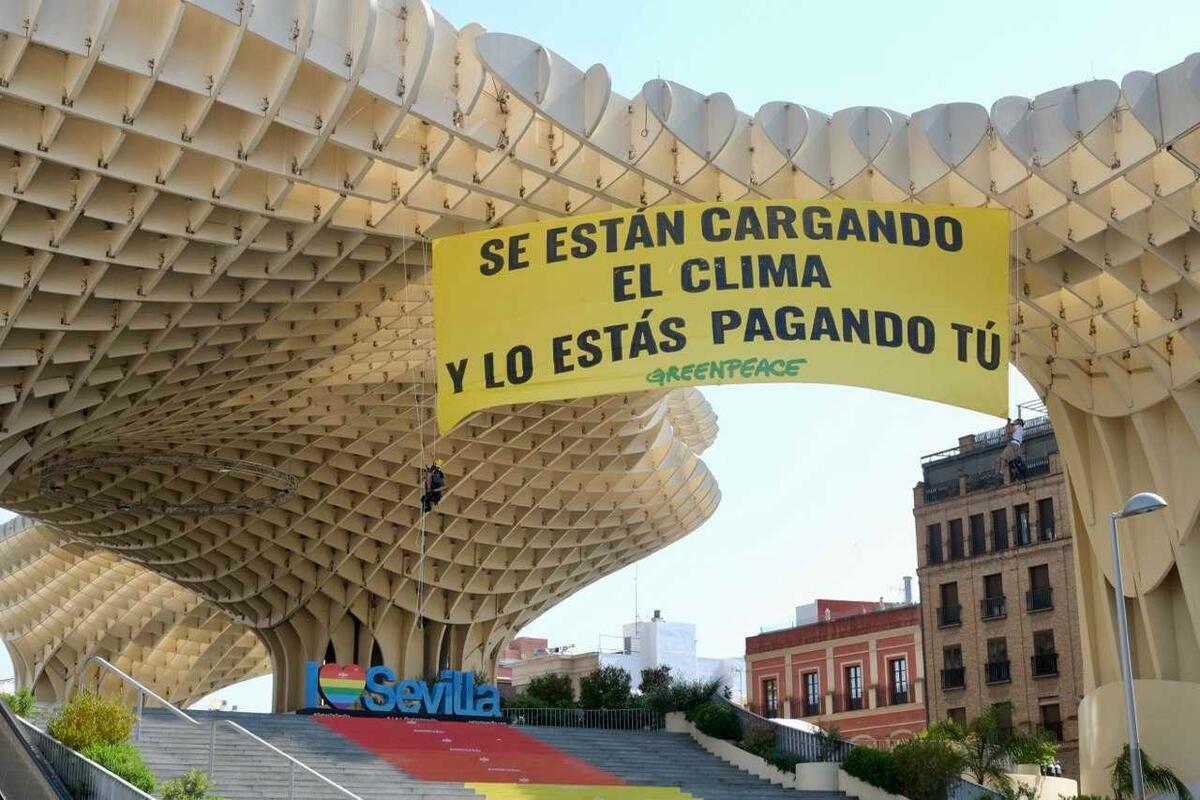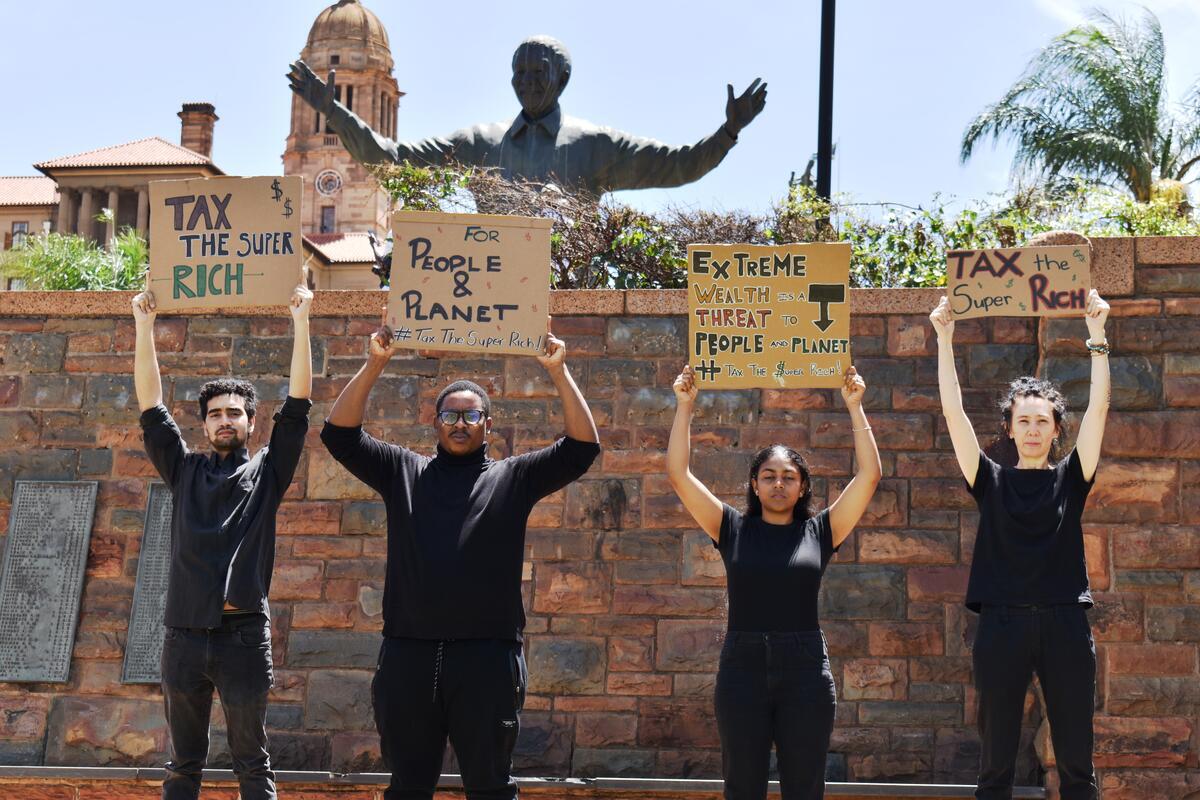Climate justice calls for accountability, demanding that those most responsible act to rectify their wrongs, accepting nothing less for those most impacted by the climate crisis. It is the fight for the very existence of humanity, for a dignified life, a safe future for all, and for the protection of the different ways of life under threat by the climate crisis; a crisis caused by corporate polluters, financial backers and by governments, yet unable or unwilling to act sufficiently or at all on behalf of peoples’ rights. From Mexico and Switzerland to the Pacific Islands, those who have contributed the least to the climate crisis are the most exposed to its impacts. The injustice at the core could break you. But the good news is that people are not giving up; this fight is increasingly being fought — and won — in courtrooms around the world.
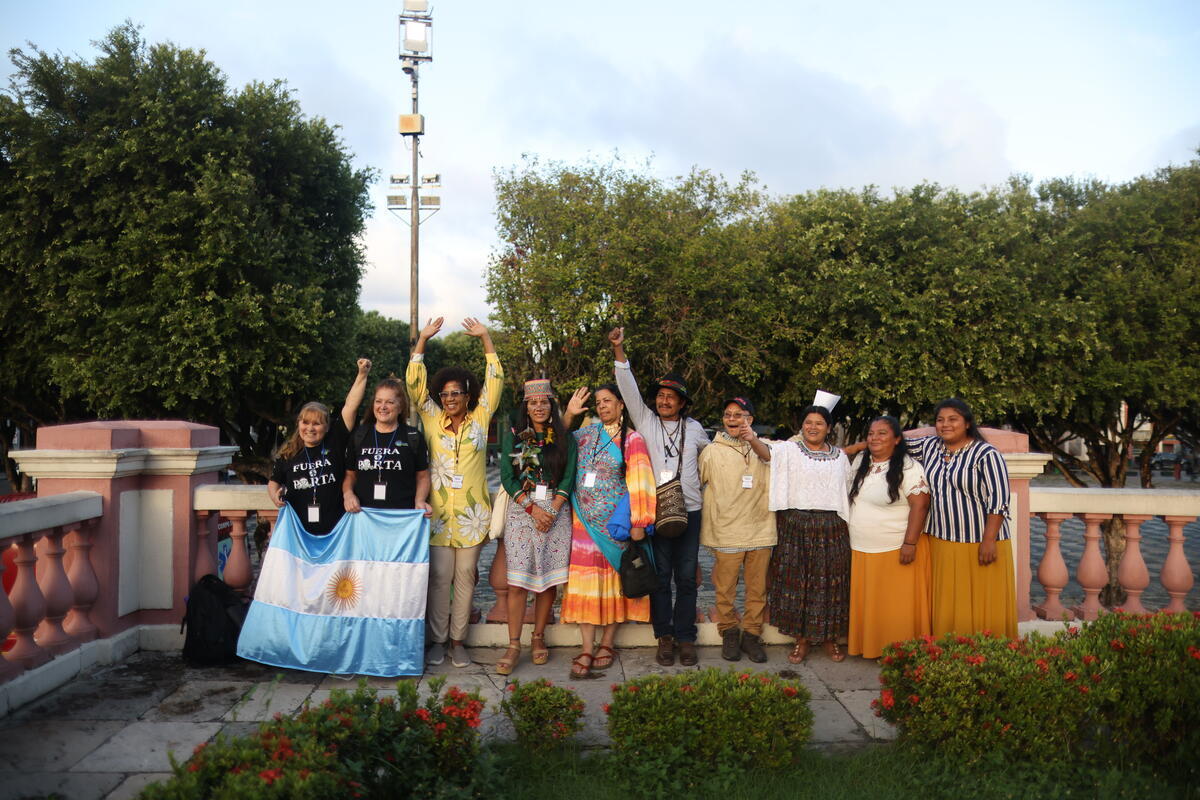
In April and May 2024, a groundbreaking set of hearings at the Inter-American Court of Human Rights (IACtHR) for the Advisory Opinion on the Climate Emergency and Human Rights, took place in Barbados and Brazil, respectively. The hearings focused on the obligations of States and non-State actors in the context of the climate emergency. More than 150 delegations were there to share their stories, including representatives from the El Bosque community, the first in Mexico to be officially recognised by authorities as climate-displaced, who attended the hearings supported by Greenpeace Mexico, Conexiones Climáticas and Nuestro Futuro Mexico. Greenpeace International joined a coalition of legal and science experts to present arguments before the court as well.
Let’s take a look at these crucial hearings at the IACtHR to better understand the legal process, the role of Greenpeace International and ally organisations in supporting communities impacted by the climate crisis, and how it connects to the global fight for climate justice. To help us understand the complex machinations of the courts, we’ve asked Greenpeace International Climate Justice & Liability Legal Counsel Maria Alejandra Serra to unpack the procedures and potential impacts.
How is the role of climate litigation growing within the environmental movement?
Maria Alejandra: We are in decisive years for climate justice. All around the world, in multiple courts, we are seeing the transformational impact of legal strategies that are centred and led-by those most impacted. With more frequent and severe extreme weather events and climate impacts disrupting the lives of those least responsible, the calls for accountability and justice are growing louder by the day. And those calls are now being heard in international courts!
In April, the KlimaSeniorinnen, the association of the Swiss Senior Women for Climate Protection, had a historic victory at the European Court of Human Rights (ECtHR). The ECtHR found that Article 8 of the European Convention was violated because Switzerland had failed to take necessary measures to, among others, sufficiently reduce its greenhouse gas emissions in light of its capabilities and best available science.
In May, the International Tribunal for the Law of the Sea (ITLOS), issued a historic advisory opinion stating that greenhouse gas emissions are a form of marine pollution under the UN Convention on the Law of the Sea, a significant step forward in international environmental law and the protection of our oceans.
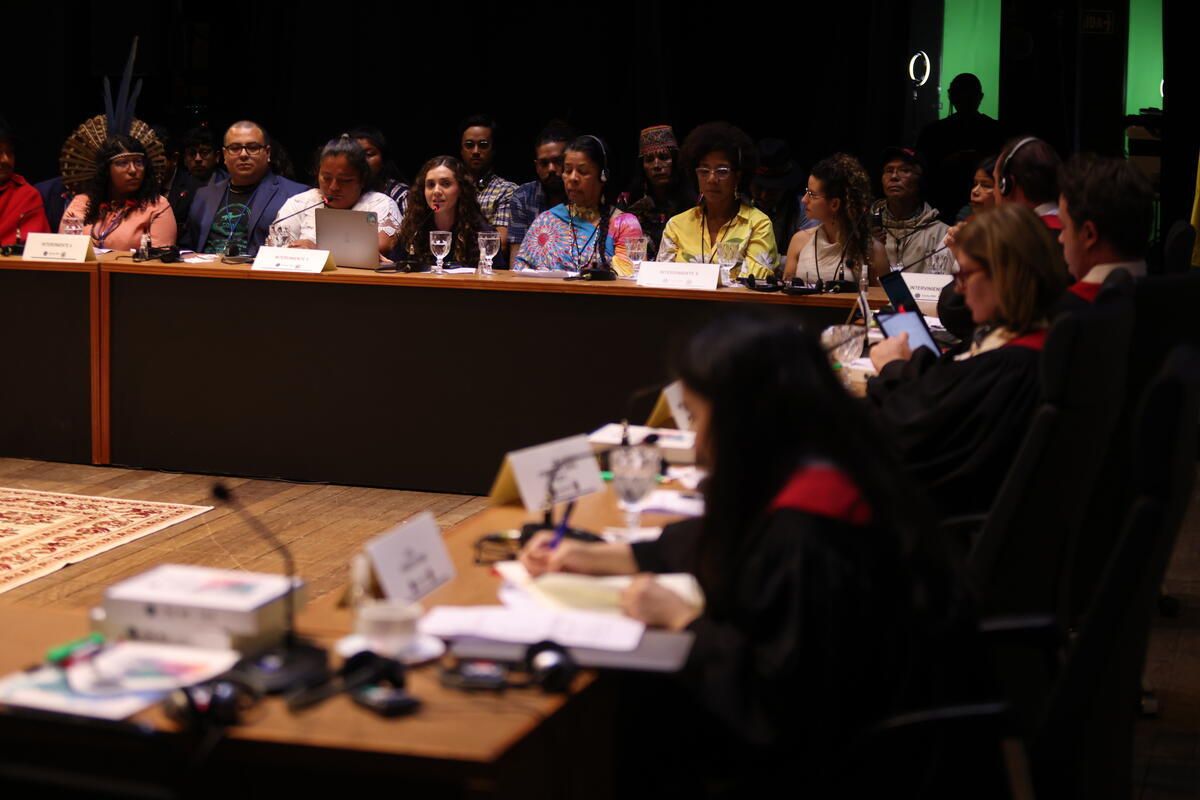
Meanwhile, the Inter-American Court of Human Rights (IACtHR) held two historic hearings, in what has been the most participatory Advisory Opinion in the history of the Court. For days, the judges heard the testimonies of Indigenous Peoples, impacted communities, civil society organisations, scientists, academics and many other groups that travelled to Barbados and Brazil to demand climate justice. It was revolutionary. We expect a decision from the Court in the next year.
Likewise, the International Court of Justice is preparing Advisory Opinions that will also help to clarify the legal obligations of States to protect human rights in the context of climate change.
What is the Inter-American Court of Human Rights?
Maria Alejandra: The Inter-American Court of Human Rights (IACtHR) is the highest human rights court in the Americas region. It was established in 1979 as an autonomous legal institution whose objective is to interpret and apply the American Convention, a treaty adopted in 1969. The IACtHR is one of three regional human rights courts in the world together with the European Court of Human Rights and the African Court of Human and Peoples’ Rights. We are witnessing the widespread human rights impacts of the climate crisis as these issues have made it all the way to the highest regional and international courts on human rights.
What is the legal role and authority of the IACtHR?
Maria Alejandra: One of the most important functions of the Inter-American Court of Human Rights is the issuing of Advisory Opinions at the request of Member States of the Organisation of American States.
Although the Advisory Opinions are non-binding, they play an important role in the interpretation and clarification of the legal obligations of states in the Americas under the human rights law framework. The Advisory Opinions of the IACtHR can shape the legal development in the region, help advance public policy ambition, and influence other courts around the world.
For example, in the groundbreaking Advisory Opinion from 2017 (OC-23/17), the IACtHR explicitly recognised the link between the protection of the environment and the realisation of human rights and, for the first time, that the right to a healthy environment is an autonomous right under the Inter-American system. This means that the right to a healthy environment protects nature on its own and not only because of the services or benefits it provides to people (¶ 62). Also, as explained by the Sabin Center For Climate Law at Columbia Law School, through the recognition of States’ responsibilities for transboundary harms this Advisory Opinion opened the door for rights based on environmental harm, including climate.
Who requested this new Advisory Opinion and what is it about?
Maria Alejandra: In January 2023, Colombia and Chile submitted an Advisory Opinion Request to the Inter-American Court of Human Rights asking it to further clarify the legal foundations and scope of the human rights that are affected by the climate emergency. Moreover, they asked the Court to clarify the obligations of States under international human rights law.
In the request, Colombia and Chile acknowledged the state of emergency of the climate crisis, the impacts of current temperature levels on human rights and the risks of irreversible impacts if the 1.5ºC limit was surpassed. The States asked the Court to consider the differentiated impacts that climate change is having on Latin American and Caribbean States and the increased vulnerability of some communities in already vulnerable situations due to geographic location, weather, socioeconomic factors, gender, age and race.
The States asked over 16 questions to the Court, covering all kinds of topics, from children and future generations’ rights, the obligation to protect human rights defenders, women and Indigenous and Tribal people, to corporate accountability.
What makes this Advisory Opinion on the Climate Emergency and Human Rights so important?
Maria Alejandra: An Advisory Opinion clarifying the human rights obligations of States and business enterprises in the context of climate change could be crucial for the protection of human rights in the region. It could inform and prompt the development and implementation of necessary climate policies to respond to the climate crisis in an equitable, fair and sustainable way that ensures the protection of the rights of present and future generations.
Why did Greenpeace International decide to participate in this Advisory Opinion?
Maria Alejandra: Following the Rules of Procedure of the Court, the IACtHR called all interested parties to submit written observations on the points presented by the States in the Advisory Opinion request, according to their expertise, interest or area of work.
Participation before the IACHR Court in the Advisory Opinion process was a historic opportunity for civil society organisations, impacted communities and many other groups to be part of the development of the applicable legal framework so it prioritises people and climate justice.
One of the biggest challenges that we see in the current legal framework is the lack of accountability for corporations for their significant contribution to the climate emergency. Despite all the harm they have already caused to people and the environment with their business activities and the significant evidence of the concerted campaigns to promote scepticism of climate science, obstruct climate regulation, and spread disinformation, the fossil fuel and agribusiness industries continue to operate with virtual impunity. This Advisory Opinion gives us the opportunity to push for the much needed development of the law, towards the recognition of concrete and determined obligations of States and corporations in relation to the climate crisis, based on the best available scientific knowledge and the needs and demands of those most impacted by the climate crisis.
How did Greenpeace International begin collaborating with allies on this case?
Maria Alejandra: We partnered up with allied organisations that have similar views, expertise and interest in corporate accountability, community-led litigation and climate science. To us, the partnership with an organisation like the Union of Concerned Scientists was crucial, because of their technical expertise and understanding of topics like attribution science.
But most importantly, with Greenpeace Mexico, we also supported the El Bosque Community submission to the Court. The most impacted by climate change are the ones who are better equipped to define the solutions they need. Their testimonies and demands of climate justice, together with the testimonies and demands of hundreds of other impacted communities, could have the biggest impact in this Advisory Opinion.
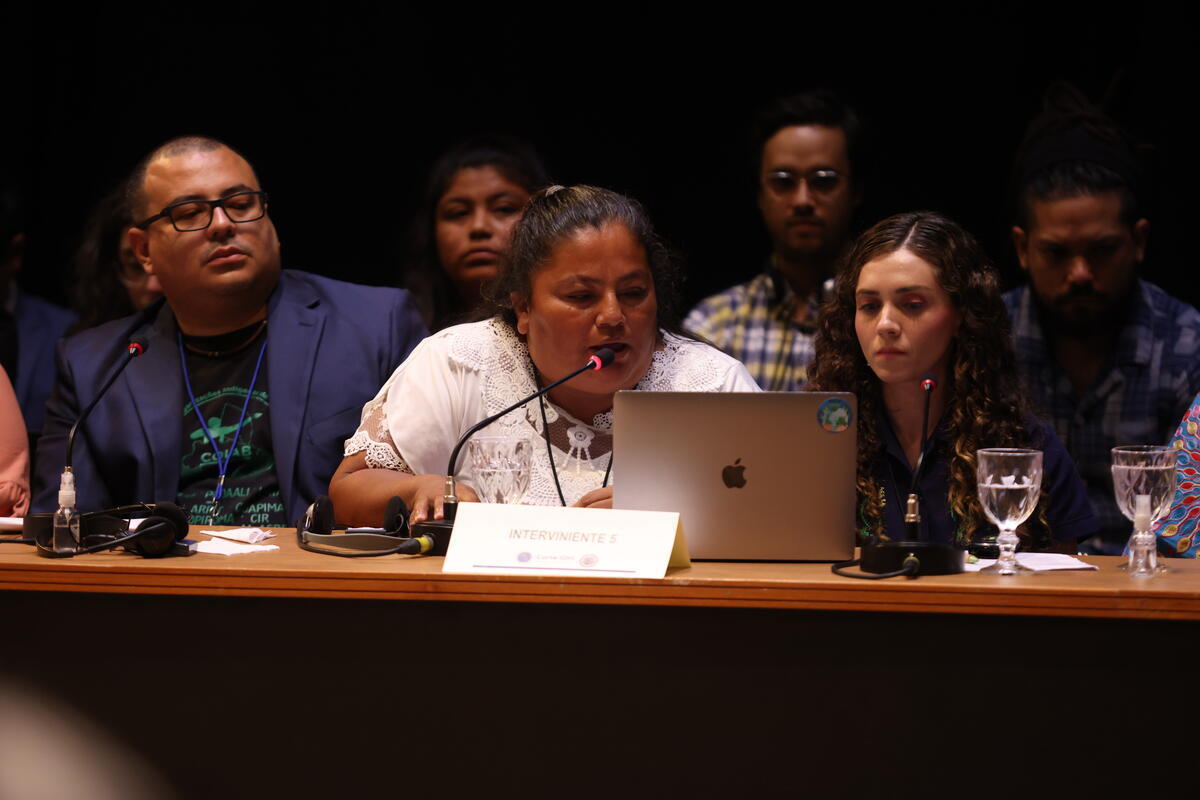
What was Greenpeace International’s role during the hearings before the Court?
Maria Alejandra: After submitting written observations in December of 2023, the IACtHR invited us to participate in the hearings taking place in Barbados in April 2024.
Alongside Dr. Carly Phillips, I had the honour to deliver the oral pleadings on behalf of Greenpeace International and our coalition. So far, this has been the most special and important moment in my career. I am very proud that we named the names of those most responsible for the climate crisis and made a call to the IACtHR to stop the legacy of impunity of the fossil fuel and agribusiness industry and their destructive and deceitful practices.
Representatives from the El Bosque Community were also invited to participate in the hearings in Brazil. Aurea Sanchez, her daughter Yensenia and attorney Nora Cabrera delivered an impactful message to the Court. Read more about their intervention.
What does a successful outcome look like?
Maria Alejandra: If you ask me, the Advisory Opinion has already been a success. The process itself before the Court has been revolutionary. With 265 written observations and over 150 oral interventions, this Advisory Opinion has been the most participatory one in the history of the Court.Hundreds of people, who have been wronged or ignored by their own governments, were heard by the Court and told their stories. Instances like these hearings are redefining who is being heard, who has power and how power is used.
The IACtHR has the opportunity, first and foremost, to acknowledge that human rights cannot be guaranteed without a stable climate. We expect the Court to acknowledge the injustice of the climate crisis, the inexcusable lack of action and omissions of States and the active role that the fossil fuel and agribusiness industries have played and continue to play in creating– and exacerbating- the climate crisis and human rights violations. The Court has the power in its Advisory Opinion to establish that States have an obligation to put in place climate policies to phase out fossil fuels and to stop the destruction of natural carbon sinks, ensuring the participation and meaningful consultation of impacted communities and civil society organisation; and could also establish that business enterprises have an independent obligation to respect human rights, and therefore, that they must commit to ambitious reduction of GHG and the reparation of the damages they have already caused.
What are the next big moments for the climate justice movement?
Maria Alejandra: This year has already been amazing for the climate justice movement. With the unprecedented victory of the KlimaSeniorinnen before the European Court of Human Rights, the groundbreaking Advisory Opinion of ITLOS and of course the hearings before the IACtHR on the Climate Emergency, history has already been made!
Thanks largely to the efforts of so many climate-impacted communities, the Advisory Opinion of the IACtHR and the Advisory Opinion of the International Court of Justice on climate change can continue to push the law for the protection of people, future generations and nature.
Maria Alejandra Serra is Legal Counsel, Climate Justice and Liability at Greenpeace International and Chris Greenberg is a Content Editor at Greenpeace International.

